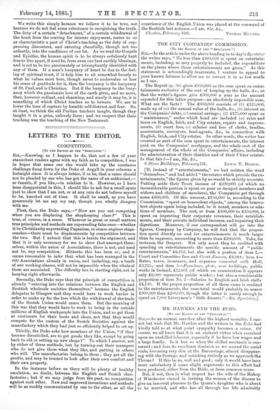THE CITY COMPANIES' COMMISSION.
[To THE EDITOR OF THE " SPECTATOR."] • SIR,—In the article under the above heading in to-day's Spectator the writer says," No less than £400,000 is spent on entertainments, including, as may properly be included, the expenditure on the places where those entertainments are given." As this statement is astoundingly inaccurate, I venture to appeal to your known fairness to allow me to correct it in as few words as I can.
The Report (p. 36) gives £100,000 as the sum spent on entertainments exclusive of the cost of keeping up the halls, &c., so that the writer's figures give £300,000 a year as the amount expended for this latter purpose—an absolutely impossible sum. What are the facts? The £300,000 consists of (1) £125,000, made up of (a) the annual value of the halls, &c., (b) interest on the Companies' debts, (c) annual savings ; (2) £175,000 spent on " maintenance," under which head are included (a) rates and taxes on English, Irish, and City estates, repairs and improvements, (5) court fees, (c) salaries and fees of clerks, beadles, accountants, surveyors, land-agents, &c., in connection with English, Irish, and City estates. In other words, the writer has counted as part of the sum spent in entertainments, the interest paid on the Companies' mortgages, and the whole cost of the management of the whole of the Companies' affairs, including the administration of their charities and of their Ulster estates. Is that fair P—I am, Sir, &c., 6 Stone Buildings, February 7th. LEWIS T. Mum:.
[If, instead of "entertainments," we had written the word "themselves," and had added "the estates which provide the entertainments," the figures given by us would be strictly accurate. Putting aside their Trust income of £200,000 (of which no inconsiderable portion is spent on poor or decayed members and widows and children of members), the Companies get through some £600,000. Of this amount, £150,000 is, according to the Commission, "spent on benevolent objects," among the benevolent objects again being included, be it noted, members or relations of members. The rest, or from £400,000 to £450,000, is spent on improving their corporate revenues, their establishments, and their private individual incomes, and impairing their digestions. Moreover, if our correspondent will go into the figures, Company by Company, he will find that the proportion spent directly on and for entertainments is much larger than he supposes, amounting to more than £200,000, Take, for instance, the Drapers. Not only must they be credited with spending on entertainments the specific amount of " public entertainments," £6,112, but also with a portion of item 1,— Court and Committee fees and Court dinners, £4,984; item 4— Rates, taxes, insurance, and expenses connected with Hall, £3,715; and item 5—Furniture, plate, new buildings, public works in Ireland, £12,861 (of which on examination it appears only £2,000 represents public works) ; but also a considerable proportion of item No. 2—Salaries to English and Irish staffs £4,149. If the proper proportion of all these sums is credited to the entertainments, the sum-total would probably be nearer £300,000 than £200,000, though the latter is surely enough to spend on 7,000 Liverymeu's "little dinners."—En. Spectator.]


































 Previous page
Previous page